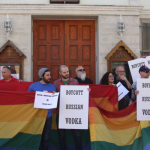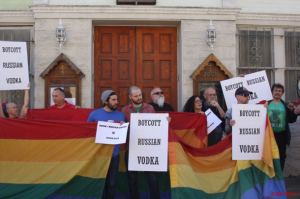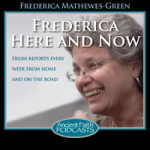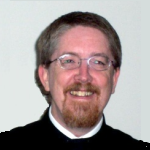Deprecated: trim(): Passing null to parameter #1 ($string) of type string is deprecated in
/home/aoiusa/public_html/wp-content/plugins/sexybookmarks/public.php on line
388
Deprecated: trim(): Passing null to parameter #1 ($string) of type string is deprecated in
/home/aoiusa/public_html/wp-content/plugins/sexybookmarks/public.php on line
394
Deprecated: trim(): Passing null to parameter #1 ($string) of type string is deprecated in
/home/aoiusa/public_html/wp-content/plugins/sexybookmarks/public.php on line
400
Steve Gershom (a pseudonym), the author of the following essay, is a faithful Catholic who has abandoned the homosexual life-style. Gershom affirms many points made earlier on the AOI Observer: the term gay, or even homosexual describes behavior and should never be construed ontologically, as a constituent of self-identity; homosexual actions are always sinful; the life of celibacy is not to be understood as a life of sexual self-denial, but at as a vocation (just as marriage is a vocation); that chastity is a means of self-integration and even joy; and more.
Where Gersham succeeds very well is putting a human face on the struggle with same-sex attraction. All passions effect some kind of orientation. When the struggle against passion is begun in earnest however, the false self constructed within the orientation loses its grip as the real self starts to emerge. The author has, and is, experiencing the liberation in ways that anyone, even those who do not struggle with same-sex attraction can understand, because we all struggle with passion in one way or another.
Source: Our Sunday Visitor | By Steve Gershom – OSV Newsweekly, 11/13/2011
 What would I know about vocation? I’m 28, a faithful Catholic and gay. A little explanation of that last part: It would be more accurate to say that I have same-sex attraction than that I’m gay. My attraction to men is deep and, as far as I can tell, permanent, but I’m celibate. I sometimes use the word “gay” as a convenient shorthand, but it carries a lot of political and even theological baggage, and doesn’t really apply to me, because of my celibacy and for other reasons that I’ll try to make clear below.
What would I know about vocation? I’m 28, a faithful Catholic and gay. A little explanation of that last part: It would be more accurate to say that I have same-sex attraction than that I’m gay. My attraction to men is deep and, as far as I can tell, permanent, but I’m celibate. I sometimes use the word “gay” as a convenient shorthand, but it carries a lot of political and even theological baggage, and doesn’t really apply to me, because of my celibacy and for other reasons that I’ll try to make clear below.
The upshot is that I’m unmarried and likely to remain that way. I’m not discerning a vocation to the priesthood or the religious life, either. I’ve been there, done that, and I’ve let the Lord know he can do whatever he wants with me — up to and including sending me to Calcutta or the Bronx — but that if he wants me to be a priest or a monk, he’ll have to do something drastic. I’ve spent a long time checking my internal compasses, and none of them point in that direction.
So what then? I know what not to do: Don’t believe the gay activists, don’t water down the faith, don’t pretend homosexual actions aren’t sinful. Don’t have a boyfriend; don’t get married. Don’t, don’t, don’t. But nobody ever had a vocation that consisted in not doing something. Marriage, the priesthood, the religious life — these involve definite actions, definite commitments.
Parched, despondent
I’d like to give a road map to people like me — I mean not only other men and women with SSA, but everyone called to the single life — but it’s difficult to make a map when you’re still on the ground. At least I’m not lost in the desert any more, parched and exhausted like I was through my teens and early 20s. I’m heading toward civilization now, or better yet toward Zion, but there’s a lot of rugged landscape between here and there. The best I can do is to tell you where I’ve been and what I’ve learned.
It’s good to start on the edge of the desert. I’ll pick age 14, because that’s when I first started thinking of myself as gay. At the time, I understood exactly two things by the word. The first was that I was totally, irrevocably different from other boys. The second was that being gay and Catholic meant a long, dreary life of self-repression. So I believed at the time.
That was the beginning of my vocation as a professional sufferer, a position I held until somewhere in my early 20s. The darkness gathered around me, and I let it in, and was even proud of it. My suffering meant I was deep, sensitive and tragic. I don’t mean to downplay the experience; when I call it a desert, I’m being poetic but I’m not exaggerating. This was Death Valley in July, except when it was Antarctica. But in more literal terms, the darkness consisted of these things: intense self-consciousness; near-constant feelings of isolation; pervasive regret at what I considered a wasted past; an absolute inability to live in the present; and terror at the prospect of the long, lonely future.
The technical name for the condition is despondency. I call it despondency, rather than depression, because depression is a state of the mind, the emotions, and even the body; whereas despondency is a state of the will. It comprises a particular response to depression. Depression doesn’t necessary constitute a roadblock to one’s vocation. Despondency does, because we are judged on the basis of what we do rather than what we feel.
What I was doing was precisely nothing, because that was all I believed I could do. That’s what despondency is. I thought I was doing something, namely living through the suffering that I believed was my vocation, that I even believed God wanted for me. And maybe I was justified in believing these things, given the premises I had accepted. It’s just that my premises were very, very wrong.
Leaving behind self-pity
In the middle of my desert I encountered a different set of premises, from a variety of sources: mostly my spiritual director, Father T, but also from good books (“Growth Into Manhood,” by Alan Medinger), good organizations (People Can Change), good experiences (three months in Peru), and good friends (you know who you are). Up until that point I had believed that the statement “I am gay” is the same sort of statement as “I am male” or “I am human.” Homosexuality was supposed to be an essential, rather than an accidental, part of me, just as deep as gender or species, or deeper.
This idea comes from the gay rights movement, but an awful lot of Christians believe it too. It is utter poison. If gay is what I am (or “who I am,” as the saying goes), then Catholicism really does require a mode of existence in direct contradiction to the deepest parts of me. That didn’t make sense to me, because I had always understood the Christian life as the only thing that could fulfill the deepest parts of me. But I was still trying to believe both things. No wonder I was lost.
If, on the other hand, my homosexuality is a part of me, rather than being my nature — something I have, rather than something I am — then things are different. It became apparent that I could change. I don’t mean stop liking men and start liking women. I mean everything else: my self-imposed vocation of suffering, my self-pity, my self-isolation, my chronic fear and regret and loneliness. Next to those things, a little celibacy isn’t too bad.
Ongoing journey
I discovered that I had a lot of work ahead of me. But I also discovered that there was something worth working for.
This space is too small to tell about my journey out of the desert. I only want to say that it is possible, that it didn’t take as long as I thought, and that it’s good to be out. And I want to say a few things about what comes afterward; what a vocation entails, and how the single life can be one.
When I was in the desert, I thought that the journey out of it would only end when I was dead. That’s true, sort of, because no place on earth is final; our hearts are restless until they rest in God. But I didn’t expect ever to be doing this well, and I didn’t expect to have to figure what to do with myself besides feeling bad. Some gay activists build their identity around being gay; I had built mine around melancholy. When the melancholy started to dry up, the temptation was to sit still and tell myself I had arrived.
But just as surely as negative action (not-having-sex, not-getting-married) doesn’t constitute a vocation, inaction doesn’t constitute a vocation, either. The universal vocation is the call to love, and love always involves action — not nice feelings, not happy dreams, but doing real things for real people.
I look at the married people I know, and at the priests and monks and nuns, and what I see is that they constantly spend themselves. Self-donation isn’t something they do on weekends, or when they have the time. It’s the air they breathe. I look at them and I see grains of wheat, falling deep into the ground and bursting open into fruitfulness. Celibacy doesn’t mean not being fertile; it just means bearing a different kind of fruit.
There’s one difference between me and them. For them, there was a moment beyond which they were definitively no longer their own. Vows were made, rings were exchanged, rites were performed; they are different now.
Is something like that necessary for me? I don’t know yet. It might be easier if it were. There’s something to be said for leaps of faith, for making vows and closing off options. I have options. There’s Opus Dei. There’s the Franciscans — third order, of course. Or I could just keep doing what I’m doing: saying my morning offering, uniting my prayers and works and joys and sufferings to those of Jesus, trying to live in the presence of God.
But whatever I do, I can’t live for myself forever. The grain of wheat has to die and be buried if it’s going to bloom. God brought me out of the desert, but he has a destination in mind, and wherever it is, I haven’t arrived. I’m just getting started.
Steve Gershom, a pseudonym, blogs at stevegershom.com.

 Clergymen and laity of the Moscow Patriarchate and the Russian Orthodox Church Outside of Russia responded to an LGBT protest with joint prayers.
Clergymen and laity of the Moscow Patriarchate and the Russian Orthodox Church Outside of Russia responded to an LGBT protest with joint prayers.





